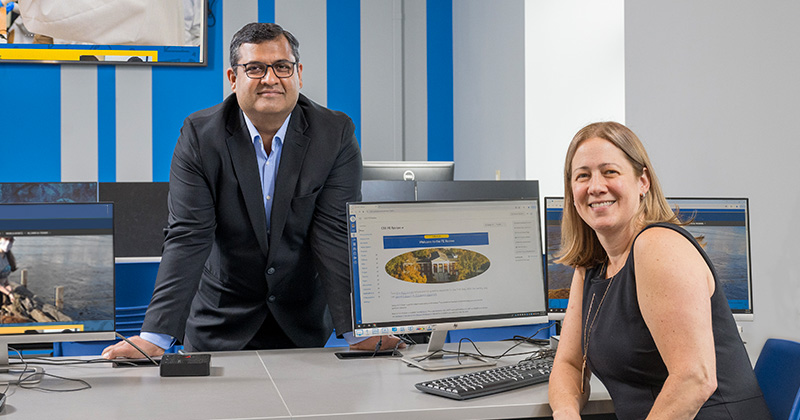
UD PCS Instructional Design Certificate supports instructional excellence in higher education
Mohsin Siddiqui, University of Delaware associate professor in construction engineering and management, has used technology to create innovative teaching strategies for more than a decade. Now, with the expertise he gained in UD PCS’ Instructional Design Certificate program, he’s working to fine-tune that innovative approach and share it with his fellow professors.
The Instructional Design Certificate gives students the skills needed to create engaging digital learning experiences and comprises three courses offered each year. For Siddiqui, the certificate also allowed him to share his newfound knowledge with receptive faculty in the Department of Civil and Environmental Engineering.
“Faculty have always consulted with instructional designers and web developers to create online materials,” he said. “I thought ‘Wouldn’t it be great for faculty themselves to be able to do it?’ That would minimize the time and effort needed to develop new courses.
“So, I took material that I needed for a civil engineering course, and over the first two courses in the instructional design program, really quickly, I learned how to create modules that were visually appealing and appropriate for my audience. My work toward the certificate had an immediate impact on the undergraduate courses that I teach.”
A department dedicated to innovative teaching
He quickly shared his lessons with fellow faculty in the department, where innovative teaching ideas were already highly valued.
Associate professor Jennie Saxe sees Siddiqui’s new knowledge of best practices in instructional delivery as a resource for the department. An example is their work on the department’s prep course for a national exam undergraduates must pass to become professional engineers.
“It’s useful to learn from someone who’s done what you’re trying to do,” she explained. “Mohsin shared what he learned with us as we moved our Fundamentals of Engineering exam prep course from a Google Drive to Canvas, UD’s learning management system. In that transition, we created a much more engaging platform for students to access review materials. We know students who are more engaged are more likely to succeed.”
Saxe applied the lessons learned to her own course in Canvas as well. “At first, I was intimidated by the Canvas design tools, but my conversations with Mohsin inspired me to give them a try. Making my Canvas sites more student-friendly was surprisingly easy.”
Siddiqui said that the mindset of constantly improving excellence is part of the department’s DNA.
“UD’s Department of Civil and Environmental Engineering has many faculty members involved in the American Society of Civil Engineers ExCEED [Excellence in Civil Engineering Education] program as fellows and mentors,” he explained. “And we have several UD Excellence in Teaching Award recipients. Our department head, Jack Puleo, who received one of these awards in 2007 and 2019, emphasizes collaboration and support for instructional excellence, so we work together to provide the best instruction possible.”
He continued, “In addition to the work at UD, I am actively involved in curricular development and accreditation through the Applied and Natural Science Accreditation Commission, a part of ABET [Accreditation Board for Engineering and Technology]. I serve on the executive committee as a volunteer and I lead training development for team chairs and program evaluator volunteers.”
Siddiqui values the opportunity to share what he learned while earning his certificate. He said, “The Instructional Design Certificate courses took us through an incremental process of understanding learning, from breaking down the subject matter to achievable and measurable goals to using proven instructional techniques and ensuring diversity, equity and inclusion, as well as accessibility, in delivery and content. I can see a useful learning community developing from this experience.”
Department chair Puleo recognized Siddiqui’s efforts to share his expertise. “For years, Mohsin has been a go-to source for faculty regarding Canvas and other IT needs for course delivery. He was especially sought out during the COVID-19 shutdown when we had to switch rapidly to online course instruction. Beyond Canvas, I am confident that with these new skills learned through earning the certificate, he will be able to assist more faculty within and outside the department hone their educational delivery.”
Projects customized for each learner
Like Siddiqui, many participants in the Instructional Design Certificate program say that the project-centered instruction and personalized feedback from the course facilitators make their learning experiences immediately useful.
“We want the learners to leverage the program for their own professional needs and goals,” director Aviva Heyn said. “That’s why we have them choose their own topic and scope for their projects. Throughout the certificate’s three courses, they will build, modify and improve their instructional design, getting personalized feedback from different course facilitators along the way who bring a lot of great know-how and experience to their teaching.”
Angela Greco, who teaches courses in the certificate program along with Tim Danner and Olivia Pollard, agreed. “As a course facilitator and experienced instructional designer, my focus is on offering supportive mentorship and timely, actionable feedback to guide learners in applying their learning and aligning our coursework with their professional goals.”
The UD PCS Instructional Design Certificate program requires the completion of a three-course series that covers foundational knowledge for instructional designers, including learning theory principles, learner needs analysis and authoring tools. The first course in the series, Foundations of Instructional Design, starts Sept. 9. You can learn more about this program on the UD PCS website.

